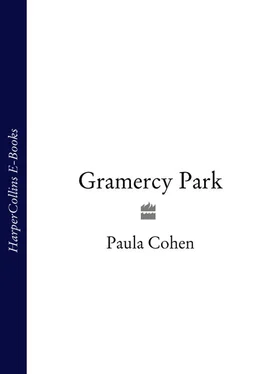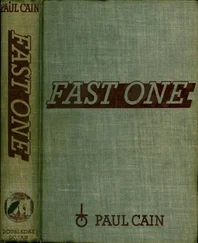“Mr. Slade was one of the first to install an electrical system in his house,” he says, “but it has evidently been turned off for safety’s sake. Shall we move on? We can open the curtains in the other rooms.”
The house agent’s voice is low, out of respect for whatever lurks just beyond the borders of hearing in silent, shut-up houses, but even so it fills the air with rustling echoes. Alfieri follows him through the doorway on the left, into the first of the house’s two drawing rooms, a chamber so vast that its far end is barely visible in the half-light. The furniture, in muslin shrouds, looks humped and unnatural; what can be seen of it is in a style current twenty years ago. Upton pulls aside the heavy drapery, and colors—ivory woodwork limned in gold, dadoes and friezes of Pompeian red—leap from the walls, only to retreat again into shades of gray as the curtain falls back into place.
Two massive sliding doors lead from there into the library and the adjacent picture gallery. Upton pulls aside a crimson plush curtain, revealing walls covered in gold and green silk above ebony bookcases filled with rare volumes. A pair of slender marble columns frames the entrance to the picture gallery. The works of art are gone from their places; they rest, instead, on the floor, carefully swathed in muslin and ranged against the sides of the chamber. Lighter patches on the silk walls show where they were accustomed to hang.
“Would you care to see more, signore?”
The signore does not answer. He stands in the center of the darkened room, a vaguely distracted expression on his face, as if trying to recall something that remains just out of reach of his memory.
“Signore?”
Alfieri rouses. “Yes, I would care to see more, Mr. Upton, but some light to see it by would be most welcome.”
“Then allow me to leave you for a few moments to find the footman—I know he must be around somewhere. There is a private generator, and if he can turn it on we shall have the whole place as bright as day. Don’t wait for me, signore. Feel free to explore more of the house while I’m gone, if you’d like. I’ll find you, never fear.”
But fear is not what Alfieri feels. The great house holds no terrors for him, despite the darkness; there is a sense, instead, of something almost remembered, like an old, familiar melody, just beyond hearing, that he cannot place.
With Upton gone in search of the generator, Alfieri retraces his steps to the front hall. The music room has been on his mind since Upton’s first mention of it, and he is understandably eager to see it. Florentine by birth, the son of a physician, his great gift had become evident at the age of four, when, seating himself at the piano, he had played, flawlessly, three exercises from The Well-tempered Clavier , learned solely from listening to the efforts of his mother, a talented amateur who was accustomed to practice the piano while her little son amused himself with his toys in the corner of the parlor. His lessons had begun immediately, and, when he was old enough, singing in his church choir had augmented his other musical studies.
When he was fourteen his voice changed.
For no reason which, in later years, he is ever able to explain, except that this is the right way, he climbs the alabaster stairs to the floor above. The darkness here is almost total, for the walls are no longer pale marble, reflecting whatever faint light may exist, but smooth wood, or so his fingers tell him; and all the doors on either side of the broad landing are shut.
He has never been in this house before today. For that matter, until one week ago he has never been in this city, or on this continent. And yet he gropes his way directly to the second door on the left, and enters. This room, too, is enormous and very dim, its drapes drawn against the glory of the spring noon. But after the oppressive darkness he has just left, his eyes easily take in his surroundings.
The music room.
Here, again, the ubiquitous muslin shrouds the furniture, and the many-armed and -globed chandelier, swathed in netting, blooms downward from the high, coved ceiling like a monstrous wasps’ nest. The pale Aubusson carpet, however, still covers the floor, and deadens his footsteps as he crosses to the grand piano between the windows, dropping his hat on a table as he goes. He seats himself at the instrument, raises the cover of the keyboard, and plays a few exploratory chords. The piano’s keys are stiff, at first, and the sound tentative, as a voice would be that had not been used in a great while, but it mellows and grows full and sonorous as he continues to play.
After a few minutes, he begins to sing. “ Una furtiva lagrima negl’occhi suoi spuntò …” Sweet and beautiful: Donizetti’s Nemorino, telling of his beloved, and the secret tear that spills from her eye …
Downstairs, at the back of the house, Upton stands by the generator, listening to the distant music, and he gapes, just a little. He is a house agent, not a poet, and not particularly gifted with words. He would not be able to describe the sound of the voice he is hearing if someone were to ask him. But others have described it for him.
It is honey, and cream, and gold. It is dark velvet and sunlight. It is incomparable. For as long as it lasts, Upton stands immobile, forgetting time, forgetting his work, forgetting everything but the sound of that voice. When it stops, finally, he stands dazed, and sighs as the everyday world settles around him once more; and as he bends to help the footman, there are tears in his eyes.
ALFIERI KNOWS NOTHING of Upton’s tears, nor would he care greatly if he did. Twenty years of singing before audiences all across Europe have accustomed him to that phenomenon, and left him largely indifferent to the power he has to make men weep. Audiences themselves are of negligible importance; they provide an excuse for him to sing, and enable him to spend his life doing what he desires by rewarding him prodigiously well for it, but they are not the reason he sings.
They are, however, the reason he is here. Paris has named him “Le Rossignol,” the nightingale; London knows him as “the Lord of Song”; to all of Italy he is “Maestro Orfeo.” His fame has become such that walking unmolested in the street—any street, in any city in Europe which boasts an opera house, and in many which do not—has become a near impossibility for him. He has left Europe to regain, for a while at least, his own soul; and Upton’s tears, did he but know of them, would be of infinitely less moment to him than what he will have for dinner.
Rising at last from the piano, more satisfied with the sound of his voice than he has been in months, he flings the curtains wide, noting with approval that the room faces onto Gramercy Park itself. The trees dance in the May wind, beckoning and abundantly green, and he unfastens the latch on one of the tall French windows and pushes the double panes outward. The fresh air, rushing into the long shut-up room, smells the color of the leaves, and all but sparkles in its clarity.
He breathes it in deeply, hands resting on either side of the window, idly watching a couple walk arm in arm in the park while two small girls chase each other in and out of the trees, and he suddenly realizes that he is happy—truly happy—with the sheer, effervescent happiness of youth; happier, in this house, than he has been in years. The very walls seem to greet him kindly, and to embrace him, as if they have been waiting for him for a long, long time.
No one lies in wait for him here, just outside the door. No one clamors for him, clutches at him, prays to him, leaves gifts for him, or flowers, or notes. If he must be lonely—God!—then let him be alone. He has not known such relief as this, such lightness of heart, for twenty years. He can be solitary in this house, and happy, the vast walls around him forming an impenetrable shell. Until he returns to Europe, he will revel in this solitude, wallow in it, free of hangers-on, of the endless crush of people that surrounds him always: smiling, weeping, fawning; ready to sell themselves at a moment’s notice, to trade their husbands or wives, sons or daughters for the slightest hint of stature, power, influence, fame … eager to suck the very breath from his lungs, or the soul from his body if he will only let them …
Читать дальше












